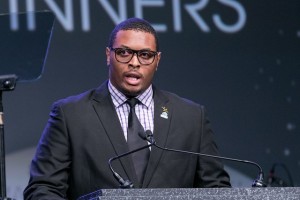CSUN Student Appointed to Executive Board of the National Society of Black Engineers

Noral Walker at the NSBE 41st Annual National Convention, March 2015. Photo courtesy of Walker.
California State University, Northridge student Noral Walker wants engineering to be a household name within the African-American community.
Before graduating in May with a bachelor’s in engineering, Walker was elected to the 2015–2016 national executive board of the National Society of Black Engineers (NSBE), an organization dedicated to fostering and supporting African-American engineers on pre-collegiate, collegiate and professional levels in the United States and internationally. He was appointed National Programs Chair in March after serving two years as the NSBE Pre-College Initiative Chair at regional and national levels.
Now a graduate student in structural engineering, Walker said the NSBE’s mission statement, “to increase the number of culturally responsible black engineers who excel academically, succeed professionally and positively impact the community,” resonates with him.
“In every single engineering class I’ve taken at CSUN, I was the only African-American student,” Walker said. “There were black students from other countries, but I was the only American one.”
Walker is determined to change that.
Shortly after enrolling at CSUN in 2009, Walker joined NSBE and surrounded himself with black engineering professionals and mentors. Seeing how NSBE could help support and grow the number of African-American engineering students, Walker re-started a NSBE chapter on campus while serving as the regional pre-collegiate chair.
NSBE connects with schools and communities across the nation to provide programming for elementary, junior high and high school students. The organization sponsored 17 Summer Engineering Experience for Kids (SEEK) camps this year in 16 cities across the country, fostering interest in engineering for almost 4,000 students at no cost to their families.
Walker said these programs could help inspire more African Americans to become engineers, which isn’t a field that African-American youth typically desire.
“At first, it doesn’t seem like a very attractive subject or career to get into because the kids think it’s boring, since they need science and math for engineering,” Walker said. “But with the summer camps, we asked the parents toward the end of the day if they saw a difference in their child, and they said their kids were now interested and excited.
“Some communities we go to are struggling. You see how some people live, you see their quality of life and you look at the possibilities of engineering and how that could enhance their quality of life. It’s really about growing the black experience.”
As national programs chair, Walker said he is working to increase the engagement of NSBE’s professional demographic with its pre-collegiate and collegiate demographic. He said it is important to provide that kind of mentorship.
Walker said he hopes the lack of diversity in engineering at the student and faculty level will change with the help of NSBE, and a push by universities to engage African-American students. The organization has an initiative to help graduate 10,000 African-American students with engineering degrees from 2025 on. NSBE is also working with the Society of Hispanic Professional Engineers, the American Indian Science and Engineering Society and the Society of Women Engineers to graduate 50,000 engineers total among the different groups within the same period of time.
“There is a unified effort to grow engineering from so many different fronts,” Walker said. “It’s exciting and challenging. Ten years is a very long time, but when it gets here we’re going to feel like we started yesterday. So many things could come up, so many twists and turns, unforeseen changes, but we can do it as long as we maintain this process without losing sight of the goal.”
Looking toward his own future, Walker is deciding between pursuing a Ph.D in engineering or working for a corporation developing blast-resistant structural design. Walker said he may or may not pursue teaching, but he knows that whatever he does, he will continue to mentor African-American engineers.
“Mentoring is something you automatically do in NSBE, and it’s something I’ll be doing until I’m too old to talk,” Walker said.

 experience
experience